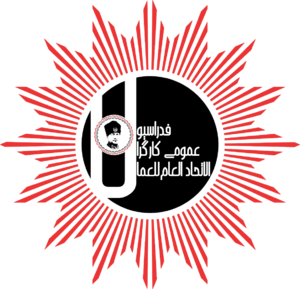General Federation of Workers
 | |
| Founded | March 9, 1979 |
|---|---|
| Members | |
| Journal | Labourer's Journal |
| Affiliation | National Renovation Front (National) |
| Key people | Samir Alal (Chairman) Mohsen Alimardani (Party Liason) |
| Office location | Zahedan, Zorasan |
| Country | Zorasan |
The General Federation of Workers (GFW) (Pasdani: فدراسیون عمومی کارگران; Ajmal-e Kârgarân-ye Ettehād; Rahelian: الاتحاد العام للعمال; al-Ittiḥād al-Āmm al-Āmilūna) is the national trade union center of Zorasan. It is one of the largest trade unions in the world, with 86.24 million members as of 2020, drawn from 395,000 trade union organisations under the jursidication of the GFW. The GFW is organised in manner reflecting the federal political system of the country, with eight state federations which hold jursidiction over affiliated trade unions within the state. The GFW is the sole legally mandated and recognised trade union, under which all trade unions and worker's associations must be affiliated to be legally recognised. The GFW is also officially subordinate to the ruling National Renovation Front, leading many to debate whether the GFW is a trade union at all, or rather an organisation dedicated to uniting the one-party state with workers and labourers.
History
The GFW was established on the 9 March 1979, the same day the National Renovation Front was established as the successor to the Revolutionary Masses Party. The GFW for its part, is the legal successor to the National Workers League, both entities were the ruling party and sole trade union of the Union of Khazestan and Pardaran respectively and formed in preparation for Zorasani Unification in wake of the Irvadistan War. However, between 1979 and 1986, the GFW enjoyed a relatively high degree of independence from the NRF, though being de-jure subject to its authority and direction.
At the 7th Revolutionary Command Congress of the NRF, this autonomy was abolished with the General Labour Relations Notification, which mandated the “labour force of the Union must be drawn into the bosom of the Front, to further consolidate the unification of the populace with the direction of state.” The 7th Congress has been subject to intense debate, as to whether the pursuit of party control over the union was for political ends or to facilitate a top-down system of labour relations. Until the late 1990s, the Zorasani government utilised the GFW to direct industrial policy directly with enterprises, while efforts at collective bargaining, representing workers’ interests and concerns declined precipitously.
In 1989, the 10th Revolutionary Command Congress expanded the GFW to establish the General Workers Media Office and the National Committee for Celebratory Achievements. These bodies were tasked with producing documentaries and publications lauding the Zorasani worker and for awarding entire enterprises, mines and factories etc, for exceeding quotas, long-term high rates of growth and innovations respectively.
In 1990, with the beginning of the Saffron Era, the GFW would be mostly side-lined by the reformist government, who saw the GFW as an obstacle to the neo-liberal minded economic reforms. Throughout the 1990s, the GFW becamed markedly critical of the party leadership, as its economic reforms were conducted to little to no protection of the millions of workers employed by state enterprises, that formed the backbone of Zorasan's non-petrochemical industries. In 2001, relations between the GFW and the party leadership collapsed further, as the 1990-2005 generation of leadership began to pursue mass privatisations of state enterprises and conglomerates. The GFW became a scene of the wider power struggle within the NRF, as hardliners sought to gain control of the GFW at the 2001 Revolutionary Command Congress to be used as a means to oppose the party leadership. The hardliners, backed by the armed forces secured Mahmoud Saeed Alizadeh as Chairman of the GFW, a former Union Minister for Labour Affairs under the Javad Jahandar-led government. Alizadeh redirected the GFW's efforts into becoming a genuine voice for workers' interests, becoming a public thorn in the side of the reformist government.
In 2003, the GFW organised the first every cases of industrial action against the party leadership, with the moral backing of party hardliners and the military. Between 2003 and 2005, the GFW organised over 3,680 protests, 305 strikes and during the Turfan, threatened to organise a national strike if the reformist administration did not roll back its neo-liberal reforms. The GFW's relations with the party-state improved in wake of the Turfan and the rise of a hardliner dominated government. In 2006, Alizadeh was replaced by Abdullah Khalid Hashush (2006-2014) as Chairman, with Alizadeh's return as Union Minister for Labour Affairs. In 2014, Hashush was succeeded by Samir Alal, who has been accused of restoring GFW's supine relationship with the party and repeatedly placing business interests over those of affiliated workers.
Organisation
The GFW operates a organisational structure that mirrors the federal system of government in Zorasan. The General Workers Congress of the GFW, represents workers and affiliated unions in negotiations with the federal government and national enterprises. The GWC, is then subordinated by eight State Workers Congresses which represent workers and unions before state administrations and enterprises. Mirroring the workers congresses are ten industrial unions, representing specific sectors of industry; mining, manufacturing, agriculture for example.

The GFW as an organisation is managed by the Central Workers Committee, which is headed by a Chairman. Alongside the Chairman who possess executive authority include the Party Liason and the Ministry Representatives (who represent the Ministries of Labour Affairs, Petrochemical Industry, Industry and Economic Development and Social Administration.). Unlike other unions in other countries, none of the GFW's executive officers are elected by members or affiliated unions, rather they are appointed by the Zorasani government. Executive officers are not subject to term limits, with their records reviewed every year at the annual Revolutionary Command Congresses, the review of their records may well result in either their continued appointment or replacement.
